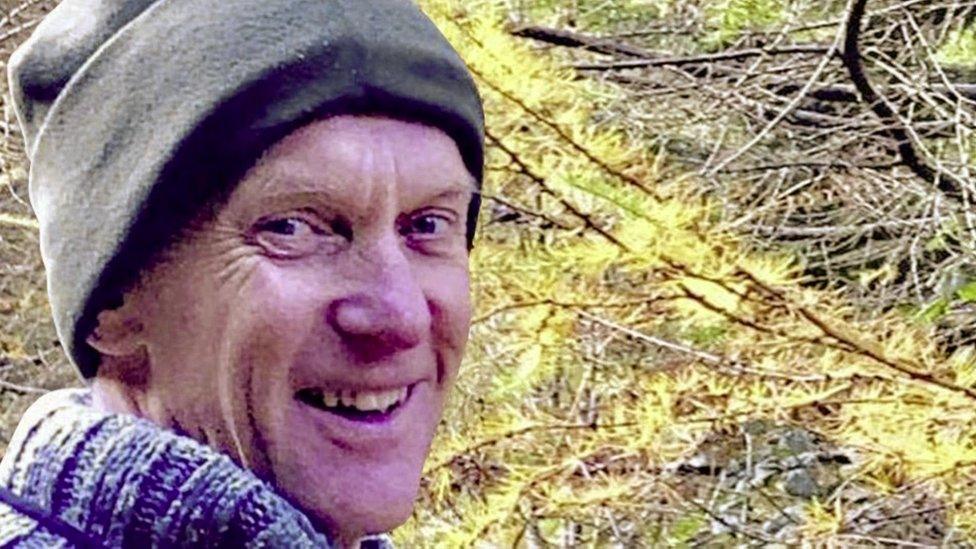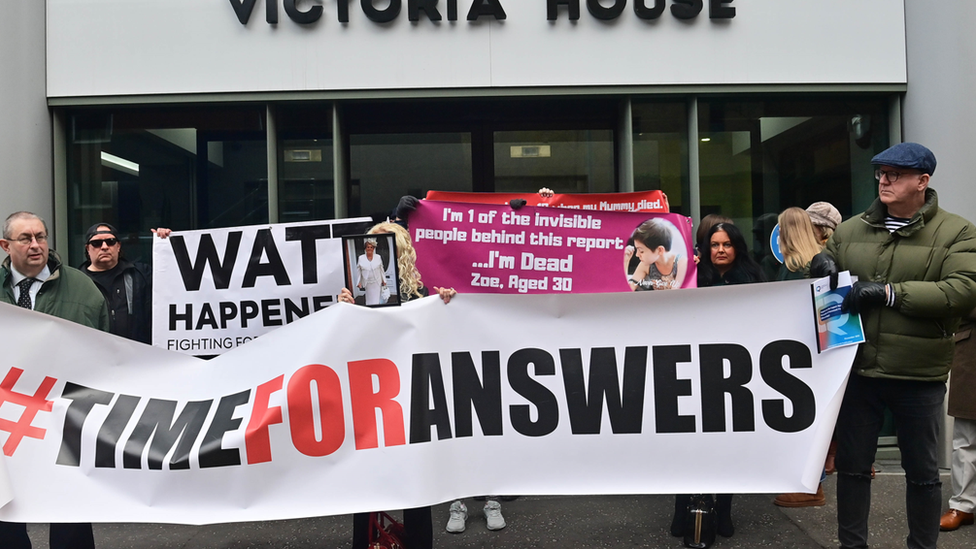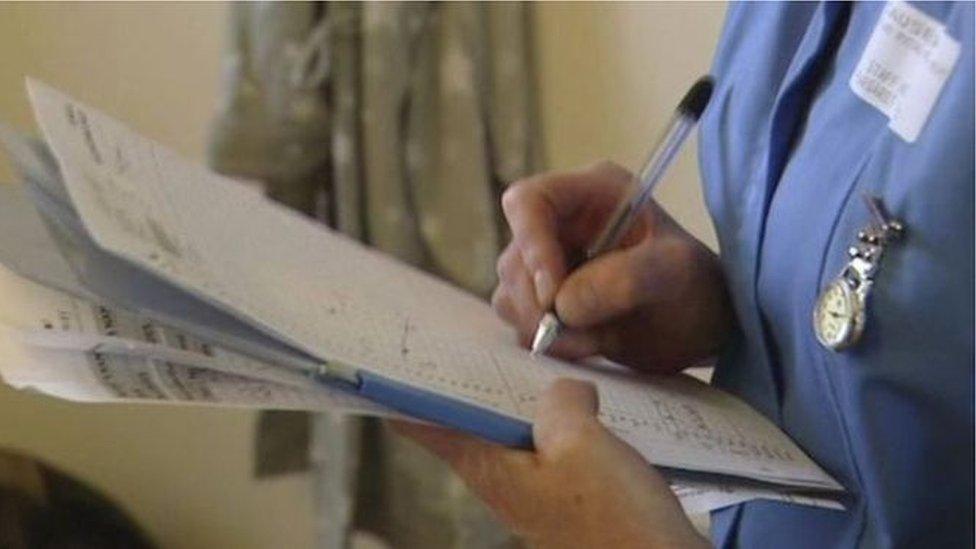Michael Watt: Review finds 'significant failures' in patient treatment
- Published

Dr Michael Watt worked at the Royal Victoria Hospital as a neurologist
A review of the clinical records of 44 patients who died under the care of former neurologist Michael Watt has found "significant failures in their treatment" and "poor communication with families".
While this review looked at a sample of cases in which people died, potentially thousands more could be affected.
The review arises from a 2018 recall of 2,500 outpatients who were in Dr Watt's care at the Belfast Health Trust.
He worked there until 2017.
About one in five patients had to have their diagnoses changed.
This separate review into 44 deaths was conducted by the Royal College of Physicians (RCP) at the request of the regulator, the Regulation and Quality Improvement Authority (RQIA).
It highlighted concerns over clinical decision-making, prescribing and diagnostics.
It reveals a misdiagnosis rate of 45% among this group of patients, twice that for living patients.

A protest involving those families affected, was held outside Victoria House in Belfast on Tuesday
Speaking to BBC News NI, the RQIA's chair, Christine Collins, said the outcome of the review was "shocking and gut-wrenching as so many had experienced unpleasant deaths which they ought not to have done".
In a litany of complaints, the panel said Michael Watt was often a poor record keeper, that he did not refer to patient notes which were often kept on scraps of paper and that cases were not taken seriously.
He was also found to be "rude and unhelpful".
Michael Watt review endorses concerns, says watchdog boss
The review into deaths was limited and has been likened to a pilot project.
Its terms of reference was also limited which meant the panel was confined to how much they could investigate.
It is also unprecedented as no other review on this scale has been carried out on patients in Northern Ireland who died under the care of one doctor.
In almost half the cases reviewed the panel did not consider the diagnosis to have been secure; also they noted in several cases the review of death certification, or referral to a medical examiner or coroner, was recommended.
Potentially that could mean the reopening of some cases by the coroner if he is approached by families to do so.

At a glance - the Michael Watt controversy:
Michael Watt is a former neurology consultant who worked for more than 20 years at the Belfast Health and Social Care Trust
In May 2018, the trust recalled more than 2,500 of his patients for checks due to concerns about misdiagnosis
Three reviews were commissioned - one into the medical records of deceased patients; two examining governance arrangements within in the Belfast Trust and in private hospitals
In October 2018, the recall was extended to a further 1,044 patients
In December 2020, an independent inquiry into Dr Watt's work was converted into a statutory public inquiry
In April 2021, a review of 927 of Dr Watt's "high-risk" patients found almost 20% of them were given a wrong diagnosis.
In October 2021, Michael Watt succeeded in his request to be removed from the medical register

Briege Donaghy, the chief executive of the RQIA, said it was a "powerful report" which had "vindicated" the concerns of patients and relatives about some of the drugs that were incorrectly prescribed.
"They were boxed in, if you like, into a diagnosis that may not have been their actual condition and that led them down a pathway of treatments that were inappropriate, medications that were inappropriate - for some with devastating consequences," she told the BBC's Good Morning Ulster programme.
Ms Donaghy said the report "demands change" and people were now asking the RQIA to take action.
"Our questions in future must be more probing. They must get into the culture of an organisation and say to people who work there: 'Are you afraid to speak up? Are you supported to speak up? Are you working with colleagues that worry you - that you're concerned about their practice?'"
Colin Armstrong's late mother Ruth was misdiagnosed by Michael Watt in 2001 and prescribed medication for epilepsy.
"While I'm glad that the RCP have admitted that my mother did not have epilepsy... they have failed to investigate the potential impact on her health of the drugs she was prescribed," he said.
Mr Armstrong said the report was "limited in its scope" and was "just the beginning" of the work that needed to be done.
An independent inquiry and a separate review of those people who had died while in Michael Watt's care was launched in 2018.
Earlier this year, the inquiry found there were numerous failures, that opportunities were missed by the Belfast Trust to identify problems with the neurologist's practice and that earlier intervention by the trust would have "made a difference".

Neurology concerns the diagnosis and treatment of conditions and disease involving the brain, spinal cord and nervous system
This latest review into deaths also identified concerns or omissions and their potential to lead to harm in almost half of the cases examined, including that some treatments were unnecessary and invasive.
Also in several cases, the review team believed patients had been "denied holistic supportive care that may have made their condition and ultimately end of life care, easier to manage".
In October last year, Dr Watt was removed from the medical register after he made a voluntary application - meaning allegations about his work could not be heard in a tribunal by the General Medical Council (GMC).
Since the launch of the inquiry in 2018, the focus has been on the experience of both patients and families.
Both the independent inquiry and the review of deceased patients found communication between Michael Watt was poor, as was communication with other consultants.
The panel found that the overriding theme of Dr Watt's clinical records tended to be "brief".
However, correspondence with private patients held in his private clinics was found to be a lot more "detailed".
A number of recommendations were made including:
That the RQIA will need to consider the implication of the finding that 14 of the 29 cases were found to be unsatisfactory for its wider consideration of the cases included in the recall of patients who died.
That the RQIA should consider the potential for harm arising from the concerns identified by the review team with respect to 13 patients' cases.
The PSNI said police were currently considering the findings of the various reviews and investigations, namely: the General Medical Council, The Royal College of Physicians, the RQIA and the Independent Neurology Inquiry.
"We will continue to liaise with the RQIA, Department of Health and Public Prosecution Service and will consider all relevant material before determining whether or not it will be necessary to conduct a formal investigation," a spokesperson said.
The Department of Health said the review's findings were "deeply concerning" and it apologised to the families affected "for the significant healthcare failings that have been identified".
It said that along with the RQIA, it would assess the findings to inform "next steps in the review of deceased patients' records".
Related topics
- Published21 June 2022

- Published21 June 2022

- Published20 April 2021

- Published19 December 2019

- Published26 July 2021
